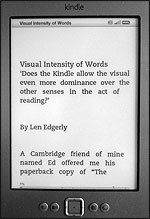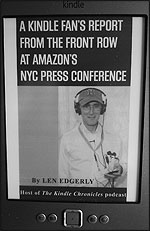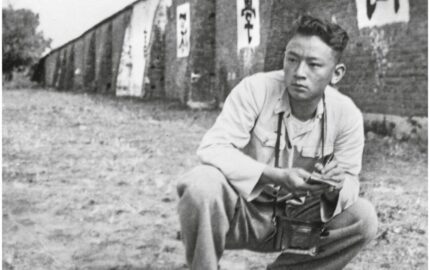A Cambridge friend of mine named Ed offered me his paperback copy of "The Namesake" by Jhumpa Lahiri this summer. I held up my hand to decline and then reached for a note card in my pocket to write the title down so I could buy the Kindle version. "I don't read that way any more," I heard myself tell Ed, who seemed as surprised as I was that this could be true.
Though I have started reading several books in print over the four years since I bought my first Kindle in December 2007, I have only completed one of them. By the summer of 2008 I'd become so excited about the Kindle experience that I started to host a weekly podcast called "The Kindle Chronicles." Doing this show has enabled me to talk e-books with close to 200 guests so far—among them journalists (James Fallows and Andy Ihnatko), authors (Steven Pressfield and Nicholson Baker), Amazon executives, kids, technologists and marketing consultants. One guest has been my wife Darlene, who reads many more books on her Kindle than I do on mine and who, except for her Kindle, loathes technology.
I buy and read more books than I did before the Kindle. I enjoy reading more than ever. That much I know. The only book that I've read on paper since December 2007 is Calvin Trillin's "Remembering Denny," a poignant memoir of his Yale classmate, a man who seemingly had everything but ended up taking his own life. A friend of mine pressured me into reading the book, even though it wasn't available on the Kindle. He thought I was being stubborn about this e-book thing. Maybe he's right, I thought. Maybe I will enjoy a great book just as much on paper as I do on the calming, reflective screen of the Kindle. So I read Trillin's book cover to cover, proving to myself that I really did prefer reading on a Kindle.
I was glad I had taken up my friend's challenge because it made me more conscious of how my reading has changed, and why. Let's start with how big the type is in print books versus Kindle versions. I am 61 years old, and I'm using the fourth-largest font on my Kindle. It's a lot bigger than the font in any of the print books that I own. This alone makes reading easier for me.
Beyond this obvious benefit to my reading, the changes get more subjective. In my experience, they add up to something like a second honeymoon in my lifelong love affair with books.
One thing you'll notice about how people talk about their Kindle (or Nook, Sony Reader, or Kobo) is how often they use the word "love." As my wife's example demonstrates, this is not because they are all gadget hounds. When Darlene says she loves her Kindle, it's not the graphite-colored plastic or the e-ink screen she's talking about. It's reading this way that she loves.
Words on a Screen
What's more difficult to describe is how these new platforms are changing reading. Authors will benefit from pondering this question because an increasing share of their readers will read them the way I now do.
As I mull how my own reading has changed, I wish Marshall McLuhan was still around. I believe he would have seen reading via e-ink technology as a further intensification of its visual dimension. As he pointed out in "The Gutenberg Galaxy," the transition from manuscripts to print strengthened the visual experience 500 years ago. "It was not until the experience of mass production of exactly uniform and repeatable type that the fission of the senses occurred, and the visual dimension broke away from the other senses," he wrote.
Is that what's happening now? Does the Kindle allow the visual even more dominance over the other senses in the act of reading?
Consider how print book lovers make the case against e-books. What do they miss most? The feel of the book, even the smell of the book. Each physical book feels and maybe smells slightly different. On the Kindle, a book is distilled to nothing but the words that the author chose, in the order he or she placed them.
On a Kindle, the font will be exactly the same as that of every other book, subject only to the reader's preference for serif (Caecilia) or sans serif (Helvetica) type. With the size I use, 87 words appeared on the screen where I found that quote from McLuhan's "The Gutenberg Galaxy." On a page of his better-known work, "Understanding Media: The Extensions of Man"—not available on Kindle, so a year ago I bought a paper copy that I haven't finished yet—a single page contains approximately 350 words.
This difference intensifies the visual impact of the words. Each word or sentence arrives in my mind through my eyes with less peripheral distraction from other words and sentences.
If you are with me so far, then follow me one step further in the development of my theory about how e-books change reading. I feel closer to the author when I read his or her work in an e-book.
We are deep into subjective experience here, but I can report on at least one test of my impression. I have alternated between reading McLuhan's "The Gutenberg Galaxy" on my Kindle and his "Understanding Media" on paper. On paper, he feels further away, as if he had written a brilliant thesis decades ago, and I found a dusty copy of it in my attic. He is no longer in the room. But on the Kindle, it's as if he's passing along his words to me as he's writing them, fewer than 100 of them at a time. It feels personal. McLuhan is not an easy read, and I do a lot better keeping up with his puns and swirling insights when I'm seeing his words on a Kindle screen.
If what I sense in using the Kindle is a shared reading experience, and if you are working on a book now, expect that many of the readers of your book will have a more intimate experience of your words than was possible before. Imagine they are in the room where you are writing because that's how it will feel to them. Be careful. Be personal. And for goodness' sake, hunt and kill every single typo. I find that they shout at me from the page of an e-book, whereas on paper they are merely irritating.
Because of new technology, people are reading in a new way. It may take another McLuhan or another 500 years before we really understand how this change will affect our modes of awareness. Meanwhile, write a book as if it will matter more to readers than ever. Thanks to e-books, I believe it will.
Len Edgerly created "The Kindle Chronicles" podcast after retiring from journalism and as a natural gas company executive. He cofounded ebooksfortroops.org, a nonprofit that distributes Kindles to U.S. military units on active duty in Afghanistan and Iraq.
Though I have started reading several books in print over the four years since I bought my first Kindle in December 2007, I have only completed one of them. By the summer of 2008 I'd become so excited about the Kindle experience that I started to host a weekly podcast called "The Kindle Chronicles." Doing this show has enabled me to talk e-books with close to 200 guests so far—among them journalists (James Fallows and Andy Ihnatko), authors (Steven Pressfield and Nicholson Baker), Amazon executives, kids, technologists and marketing consultants. One guest has been my wife Darlene, who reads many more books on her Kindle than I do on mine and who, except for her Kindle, loathes technology.
I buy and read more books than I did before the Kindle. I enjoy reading more than ever. That much I know. The only book that I've read on paper since December 2007 is Calvin Trillin's "Remembering Denny," a poignant memoir of his Yale classmate, a man who seemingly had everything but ended up taking his own life. A friend of mine pressured me into reading the book, even though it wasn't available on the Kindle. He thought I was being stubborn about this e-book thing. Maybe he's right, I thought. Maybe I will enjoy a great book just as much on paper as I do on the calming, reflective screen of the Kindle. So I read Trillin's book cover to cover, proving to myself that I really did prefer reading on a Kindle.
I was glad I had taken up my friend's challenge because it made me more conscious of how my reading has changed, and why. Let's start with how big the type is in print books versus Kindle versions. I am 61 years old, and I'm using the fourth-largest font on my Kindle. It's a lot bigger than the font in any of the print books that I own. This alone makes reading easier for me.
Beyond this obvious benefit to my reading, the changes get more subjective. In my experience, they add up to something like a second honeymoon in my lifelong love affair with books.
One thing you'll notice about how people talk about their Kindle (or Nook, Sony Reader, or Kobo) is how often they use the word "love." As my wife's example demonstrates, this is not because they are all gadget hounds. When Darlene says she loves her Kindle, it's not the graphite-colored plastic or the e-ink screen she's talking about. It's reading this way that she loves.
Words on a Screen
What's more difficult to describe is how these new platforms are changing reading. Authors will benefit from pondering this question because an increasing share of their readers will read them the way I now do.
As I mull how my own reading has changed, I wish Marshall McLuhan was still around. I believe he would have seen reading via e-ink technology as a further intensification of its visual dimension. As he pointed out in "The Gutenberg Galaxy," the transition from manuscripts to print strengthened the visual experience 500 years ago. "It was not until the experience of mass production of exactly uniform and repeatable type that the fission of the senses occurred, and the visual dimension broke away from the other senses," he wrote.
Is that what's happening now? Does the Kindle allow the visual even more dominance over the other senses in the act of reading?
Consider how print book lovers make the case against e-books. What do they miss most? The feel of the book, even the smell of the book. Each physical book feels and maybe smells slightly different. On the Kindle, a book is distilled to nothing but the words that the author chose, in the order he or she placed them.
On a Kindle, the font will be exactly the same as that of every other book, subject only to the reader's preference for serif (Caecilia) or sans serif (Helvetica) type. With the size I use, 87 words appeared on the screen where I found that quote from McLuhan's "The Gutenberg Galaxy." On a page of his better-known work, "Understanding Media: The Extensions of Man"—not available on Kindle, so a year ago I bought a paper copy that I haven't finished yet—a single page contains approximately 350 words.
This difference intensifies the visual impact of the words. Each word or sentence arrives in my mind through my eyes with less peripheral distraction from other words and sentences.
If you are with me so far, then follow me one step further in the development of my theory about how e-books change reading. I feel closer to the author when I read his or her work in an e-book.
We are deep into subjective experience here, but I can report on at least one test of my impression. I have alternated between reading McLuhan's "The Gutenberg Galaxy" on my Kindle and his "Understanding Media" on paper. On paper, he feels further away, as if he had written a brilliant thesis decades ago, and I found a dusty copy of it in my attic. He is no longer in the room. But on the Kindle, it's as if he's passing along his words to me as he's writing them, fewer than 100 of them at a time. It feels personal. McLuhan is not an easy read, and I do a lot better keeping up with his puns and swirling insights when I'm seeing his words on a Kindle screen.
If what I sense in using the Kindle is a shared reading experience, and if you are working on a book now, expect that many of the readers of your book will have a more intimate experience of your words than was possible before. Imagine they are in the room where you are writing because that's how it will feel to them. Be careful. Be personal. And for goodness' sake, hunt and kill every single typo. I find that they shout at me from the page of an e-book, whereas on paper they are merely irritating.
Because of new technology, people are reading in a new way. It may take another McLuhan or another 500 years before we really understand how this change will affect our modes of awareness. Meanwhile, write a book as if it will matter more to readers than ever. Thanks to e-books, I believe it will.
Len Edgerly created "The Kindle Chronicles" podcast after retiring from journalism and as a natural gas company executive. He cofounded ebooksfortroops.org, a nonprofit that distributes Kindles to U.S. military units on active duty in Afghanistan and Iraq.





